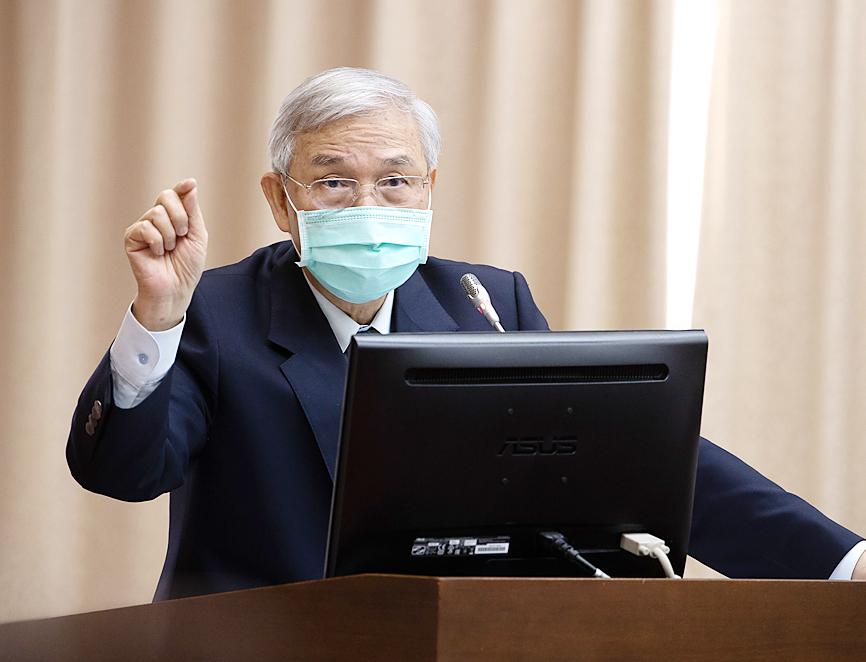Taiwan will not follow the US in setting its monetary policy, but it would pay attention to global peers’ moves, international raw material price trends and geopolitical risks, central bank Governor Yang Chin-long (楊金龍) told a meeting of the legislature’s Finance Committee yesterday.
“There is no need for Taiwan to follow the US monetary decisions,” as the US Federal Reserve is widely believed to raise interest rates by 50 basis points next month in another of six more rate hikes for this year to curb inflation, Yang said.
US inflation last month hit 8.5 percent, while Taiwan’s rose 3.27 percent, rendering drastic rate hikes unwarranted, he said.

Photo: CNA
Rather, the central bank will approach the matter by taking into consideration policy moves by global peers, inflationary pressures at home, and international fuel and raw material price movements, he said.
In addition, the central bank will seek to support the nation’s economy to meet its duty, he said.
Yang said he stood by the view that Taiwan could achieve a GDP growth of 4 percent this year, although international research bodies have cut their forecast to an average of 3.8 percent after Russia invaded Ukraine in February and crude prices have since shot up.
Consumer prices in Taiwan are likely to ease next quarter, although the landscape is teeming with uncertainties, Yang said.
The central bank will make its quarterly decisions guided by the latest global and domestic economic data, Yang said, while acknowledging that the ongoing weakening of the New Taiwan dollar against the greenback is lending force to inflation.
Consumer prices picked up 0.1 to 0.17 percentage points after the NT dollar recently softened from NT$28 to NT$29 versus the US currency, Yang said, describing the extra inflationary burden as moderate.
A weak NT dollar will not necessarily become a norm, but has much to do with global funds responding to the Fed’s rate hikes and asset adjustments, he said.
“The market will have the final say on the NT dollar’s movements, but it remains the best performer in the past two years, thanks to Taiwan’s robust economy and corporate profitability,” Yang said.
The governor reiterated that the rate hike on March 17 is not aimed at cooling the property market, even though it inevitably sent unfavorable messages.
The central bank would favor selective credit controls to prevent funds from overflowing to the property market, he said.

NEW IDENTITY: Known for its software, India has expanded into hardware, with its semiconductor industry growing from US$38bn in 2023 to US$45bn to US$50bn India on Saturday inaugurated its first semiconductor assembly and test facility, a milestone in the government’s push to reduce dependence on foreign chipmakers and stake a claim in a sector dominated by China. Indian Prime Minister Narendra Modi opened US firm Micron Technology Inc’s semiconductor assembly, test and packaging unit in his home state of Gujarat, hailing the “dawn of a new era” for India’s technology ambitions. “When young Indians look back in the future, they will see this decade as the turning point in our tech future,” Modi told the event, which was broadcast on his YouTube channel. The plant would convert

‘SEISMIC SHIFT’: The researcher forecast there would be about 1.1 billion mobile shipments this year, down from 1.26 billion the prior year and erasing years of gains The global smartphone market is expected to contract 12.9 percent this year due to the unprecedented memorychip shortage, marking “a crisis like no other,” researcher International Data Corp (IDC) said. The new forecast, a dramatic revision down from earlier estimates, gives the latest accounting of the ongoing memory crunch that is affecting every corner of the electronics industry. The demand for advanced memory to power artificial intelligence (AI) tasks has drained global supply until well into next year and jeopardizes the business model of many smartphone makers. IDC forecast about 1.1 billion mobile shipments this year, down from 1.26 billion the prior

People stand in a Pokemon store in Tokyo on Thursday. One of the world highest-grossing franchises is celebrated its 30th anniversary yesterday.

Zimbabwe’s ban on raw lithium exports is forcing Chinese miners to rethink their strategy, speeding up plans to process the metal locally instead of shipping it to China’s vast rechargeable battery industry. The country is Africa’s largest lithium producer and has one of the world’s largest reserves, according to the US Geological Survey (USGS). Zimbabwe already banned the export of lithium ore in 2022 and last year announced it would halt exports of lithium concentrates from January next year. However, on Wednesday it imposed the ban with immediate effect, leaving unclear what the lithium mining sector would do in the